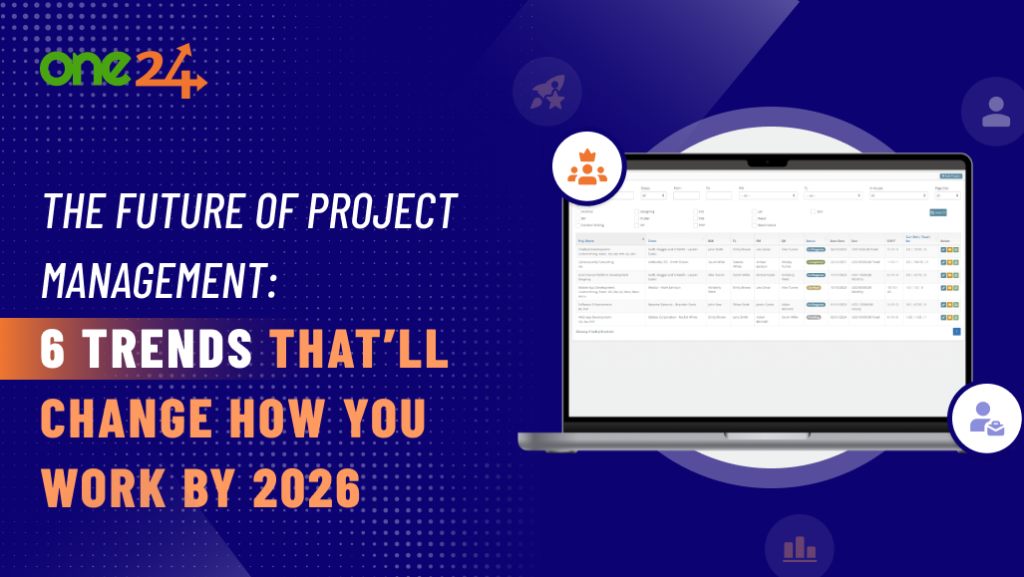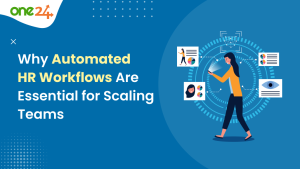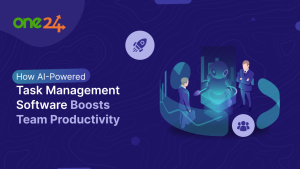Project management is not what it was. Frankly, with hybrid workflows, remote teams, and AI, how we organize and get stuff done on projects is shifting rapidly. And you might find yourself behind if you don’t keep pace. By 2026, things will look even more distinctive. Whether you’re running a small firm, leading a startup, or merely trying to get projects in shape. Knowing these trends today will prevent a whole lot of headaches down the road. So let’s dissect the 6 largest trends developing the future of project management. Why they’re important, how they operate, and what you can do to remain ahead.
1. AI Isn’t Just Coming, It’s Already Here (And It’s Kinda Scary Good)
Imagine having a virtual assistant that doesn’t just schedule meetings but actually predicts problems before they happen. That’s where AI in project management is headed.
How AI is changing the game:
- Voice updates – No more keyboarding status reports. Just say to your AI tool, “Hey, how’s the Q3 campaign going?” and receive a snap breakdown.
- Risk alerts – AI reads data to identify slowdowns, budget concerns, or burnout before they explode.
- Auto-allocated tasks – It knows who performs best on what and rearranges workloads accordingly.
- Knowledge sharing – Once a problem is solved by one team, AI ensures others do not make the same errors.
Pro tip: Start small. Try some freely available AI features or Microsoft Copilot to automate status updates. You’ll save hours.
2. Remote Teams Aren’t Going Anywhere, So You Better Get Good at Managing Them
Remote work isn’t a trend, it’s the new normal. But managing a team spread across time zones? That’s a whole different beast.
Biggest challenges:
- Time zone chaos – When your designer’s morning is your developer’s midnight.
- Freelancer turnover – Contractors come and go, so keeping everyone aligned is tough.
- Burnout risk – Out of sight doesn’t mean out of mind. Remote workers often overwork.
How to fix it:
- Set crystal-clear expectations (written docs > vague Slack messages).
- Use async tools (Loom, Slack threads, Notion docs).
- Schedule “no-work” check-ins – Sometimes, a 10-minute coffee chat builds more trust than a status update.
3. Organizational PM: Because Random Projects Don’t Grow Businesses
Here’s the thing, most companies manage projects in silos. But by 2026, the winners will be the ones linking every project back to big-picture goals.
What this means:
- Portfolio management – Not just tracking tasks, but ranking projects by ROI.
- Killing zombie projects – If it doesn’t align with company goals, why waste resources?
- Data-driven decisions – Using past project data to predict what’ll work next time.
Pro tip: Even small teams can do this. Every quarter, ask: “Is this project moving us closer to our goals?” If not, pivot.
4. Tech Moves Fast – If You Don’t Keep Up, You’ll Fall Behind
New project management tools pop up every month. The best PMs don’t just use tech, they stay curious about what’s next.
Tools worth watching:
- PSA software for automating billing and resourcing.
- Real-time dashboards to spot trends before they become problems.
- AI-powered analytics for smarter predictions.
Pro tip: Test free trials! Most tools offer 14-day demos, no commitment.
5. Soft Skills > Hard Skills (Yes, Really)
You can have the best tools in the world, but if your team hates working with you? Good luck hitting deadlines.
Why soft skills win:
- Remote leadership – Motivating people you rarely see in person.
- Conflict resolution – Stopping small disagreements from tanking projects.
- Adaptability – Because no plan survives first contact with reality.
6. Data-Driven PM: Because Guessing is So 2020
Gut feelings don’t cut it anymore. The future is real-time data telling you exactly what’s working (and what’s a disaster).
How to use data smarter:
- Track leading indicators (not just lagging ones).
- Break down silos – Marketing’s data should inform product dev.
- Learn from failures – Why did Project X flop? Data knows.
Conclusion
The future of project management isn’t coming; it’s already here. AI, hybrid workflows, distributed teams, and data-driven decision-making are changing how we work. And the pace won’t slow down. Success in 2025 and 26 won’t just be about managing tasks. It will be about being agile, innovative, and marrying technology with human intellect.
The silver lining? You don’t have to learn it all at once. Begin small, experiment with AI tools, refine your hybrid approach, or develop your soft skills. The idea is to stay curious, stay nimble, and keep your projects aligned with the overall objective. Because, in the end, the greatest project managers won’t merely adapt to change, they’ll drive it. The question is: Are you among them?







